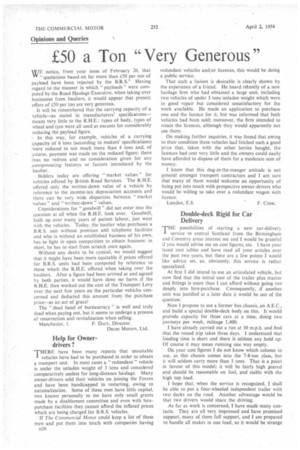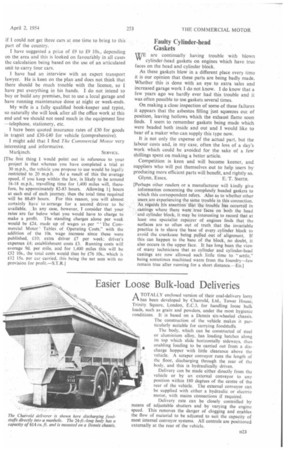Double-deck Rigid for Car Delivery
Page 60

Page 63

If you've noticed an error in this article please click here to report it so we can fix it.
THEpossibilities of starting a new car-delivery service to central Scotland from the Birmingham and Coventry areas interest me and I would be grateful if you would advise me on cost figures, etc. I have your latest cost tables and have read all your articles over the past two years, but there are a few points I would like advice on, as, obviously, this service is rather specialized.
At first I did intend to use an articulated vehicle, but now find that the initial cost of the trailer plus tractor and fittings is more than I can afford without going too deeply into hire-purchase. Consequently, if another. unit was justified at a later date it would be out of the quest ion: Now I propose to use a former bus chassis, an A.E.C., and build a special double-deck body on this. It would provide capacity for three cars at a time, doing two journeys per week, mileage 1,400.
I have already carried out a run at 30 m.p.h. and find that the round trip takes three days. I understand that loading time is short and there is seldom any hold up. Of course it may mean running one way empty.
On your cost figures I do not know which column to use, as this chassis comes into the 7-8-ton class, but it will seldom carry more than 3 tons. That is a point in favour of this model: it will be fairly high geared and should be reasonable on fuel, and stable with the high top load.
I hope that, when the service is recognized, I shall be able to put a four-wheeled independent trailer with two decks on the road. Another advantage would be that two drivers would share the driving.
As far as work is concerned, I have made many contacts. They are all very impressed and have promised support, many of them full support, and I am prepared to handle all makes in one load, so it would be strange if I could not get three cars at one time to bring to this part of the country.
I have suggested a price of £9 to.£9 10s., depending on the area and this is looked on favourably in all cases the calculation being based on the use of an articulated unit to carry four cars.
I have had an interview with an expert transport lawyer. He is keen on the plan and does not think that there should be much trouble with the licence, so I have put everything in his hands. I do not intend to buy or build any premises, but to use a local garage and have running maintenance done at night or week-ends.
My wife is a fully qualified book-keeper and typist, so naturally she will look after all the office work at this end and we should not need much in the equipment line —telephone, stationery, etc.
I haye been quoted insurance rates of £30 for goods in transit and £30-£40 for vehicle (comprehensive).
I might add that I find The Commercial Motor very interesting and informative.
Markinch. SERVICE.
[The first thing I would point out in reference to your project is that whereas you have completed a trial at 30 m.p.h., the vehicle you propose to use would be legally restricted to .20 m.p.h. As' a result of this the average speed, if you keep within the law, is likely to be around 16-18 m.p.h., travelling time for 1,400 miles will, therefore, be approximately 82-83 hours. Allowing I hours at each end of each journey, then the total time required will be 88.89 hours. For this reason, you will almost certainly have to arrange for a second driver to be available. In any case, however, I consider that your rates are far below what you would have to charge to make a profit. The standing charges alone per week would be £24, made up of wages as per "'The Commercial Motor' Tables of Operating Costs," with the addition of the 10s. wage increase since these were published, £10; extra driver £7 per week; driver's expenses £4; establishment costs £3. Running costs will average 9d. per mile, and for 1,400 miles this will be £52 10s., the total costs would thus be £76 10s., which is £12 15s. per car carried, this being the net sum with no provision for profit.—S.T.R.]








































































































